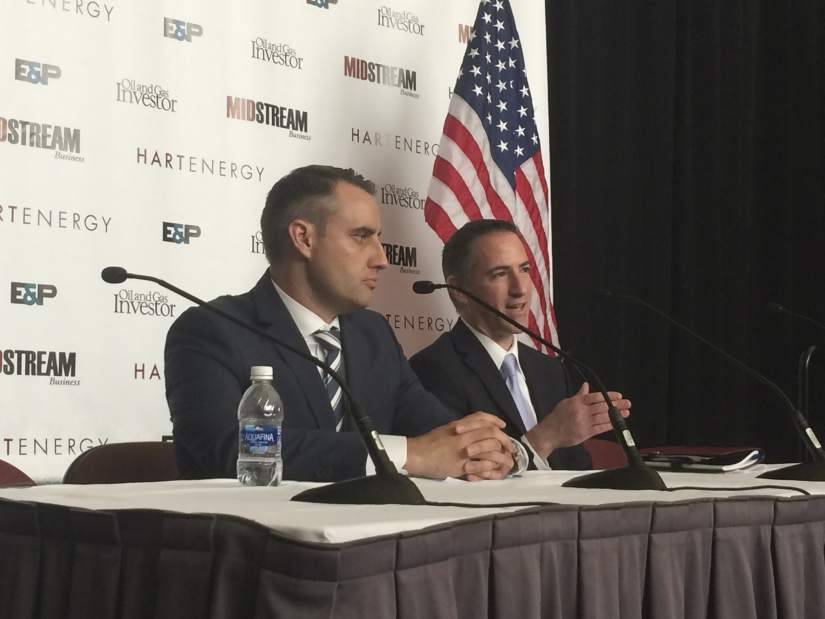Smaller, private drillers flex leaner muscles during downturn
In a shale gas industry known for big drilling rigs and boastful claims about monster wells, Callum Streeter values a more low-key approach.
“We're not putting press releases out every month,” Streeter, chief operating officer of Cecil-based EdgeMarc Energy, told fellow industry members and observers during an oil and gas conference in Pittsburgh last week. “We're looking to base things on value creation versus working headlines.”
Being privately funded instead of publicly traded gives smaller producers such as EdgeMarc and Pine-based Apex Energy more leeway to make quick decisions on where and how to drill, company leaders said at Hart Energy's annual Developing Unconventionals DUG East conference.
“The key competitive advantage we see of being private is the ability to be somewhat of a contrarian many times,” said Mark Rothenberg, co-founder and CEO of Apex, which has nine wells operating in Pennsylvania's Marcellus shale. “We're not always chasing the next quarterly analyst call. We're not worried about getting criticized for not following the herd.”
When gas prices started to tumble 18 months ago and drilling began grinding to a halt, some analysts predicted larger companies with established land positions in core shale areas would have better luck powering through the downturn and that smaller operators would be swallowed up in mergers.
Instead, companies such as EdgeMarc, Apex and Moon-based PennEnergy Resources have survived by taking what their leaders call a more nimble approach to production and finding niches to explore.
“There's no question we can make decisions quicker,” PennEnergy CEO Richard Weber said, noting public companies have more “bureaucracy.”
Streeter said EdgeMarc could be looking to buy good assets from others.
“We have no debt,” said Streeter, whose 35-employee company was formed in 2012 with $750 million in private backing. “With this downturn in the commodity price environment, it puts us in an advantageous position to be opportunistic.”
With little or no debt and fewer expenses, a smaller producer could fare well if prices eventually start to rise, one analyst said.
“If you have a debt overhang now, it's going to kill you,” said Kent Moors, editor of Oil and Energy Investor. “It is true that some of the smaller, privately funded (producers) can operate more efficiently.
“On the other hand, they can't diversify their losses,” he said, noting that the companies eventually will face pressure from investors to produce profits.
Until then, Streeter, Rothenberg and Weber said their companies have positioned themselves to succeed when prices rebound from the 17-year lows they hit this spring.
“We're convinced market constraints will disappear in the next one to two years,” said Weber, who expects to resume a full drilling program this fall that was halted at the end of 2014.
Weber, a former head of Atlas Energy, formed PennEnergy after oil giant Chevron bought most of Atlas' assets in 2011. Its 32 employees, backed by $450 million in equity, have focused their drilling on parts of Butler, Beaver and Armstrong counties that most operators consider to be outside the most productive Marcellus shale beneath Washington and Greene counties.
“The core area clearly extends north of Pittsburgh,” Weber said after outlining well results that he says show those regions have as much promise as the southern shale areas. The company has 36 producing wells.
EdgeMarc also started in Butler County, where Streeter said infrastructure for moving and processing gas and liquids already was in place. Before low prices prompted the company to stop drilling at 56 wells, it started focusing on drilling in the deeper Utica shale in Monroe County, Ohio.
Not having a continuous drilling program like some big operators means EdgeMarc can't negotiate bulk deals with service companies, Streeter said. But it can be more flexible with some techniques, he said.
In Butler, the company experimented with smaller-diameter wells that cut drilling costs without reducing production, he said. In the Utica, it drilled shorter horizontal lengths than some competitors.
“We can be more nimble,” Streeter said. “We can make quick decisions.”
For Apex, getting away from the pack meant drilling its wells in western Westmoreland County. Although it's outside the runway of other drillers, Rothenberg noted that interstate pipelines crisscross that area, and production results have been comparable to those in Washington and Greene.
“It's a huge competitive advantage to not worry about … having to sell this to some analyst,” he said about such decisions.
He expects prices and demand to rise next year with tumbling supply because drilling slowed so much in the Marcellus.
With an undisclosed amount of funding from Apollo Global Management, Apex “spent the past 12-18 months during this market downturn drilling wells, proving up the well performance and building up permit inventory” in preparation of market improvement, Rothenberg said. “It is ready for full field development.”
David Conti is the assistant business editor at the Tribune-Review. Reach him at 412-388-5802 or dconti@tribweb.com.



